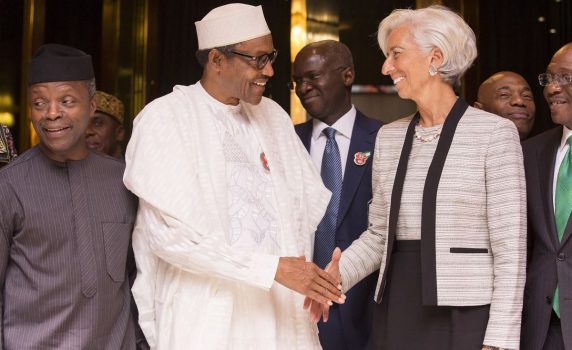The International Monetary Fund (IMF) on Thursday ranked Nigeria as the second worst country in the world in the use of sovereign wealth funds.
In its Fiscal Monitor report released at the ongoing Spring Meetings of the World Bank and IMF in Washington, the IMF also advised the Federal Government to embark on tax reforms to enhance economic growth.
The IMF Fiscal Monitor report showed that Nigeria beat only Qatar in the 33 countries ranked while Ghana’s Sovereign Wealth Fund came second on the top performers just after Columbia.
The Fund said the index was compiled using the corporate governance and transparency scores of the sovereign wealth funds and the size of assets as a percentage of 2016 GDP of all the countries considered.
Explaining that sovereign wealth funds have to be transparent, the IMF advised that developing countries should ensure that the natural resources of countries should be channeled properly to only the people in dire need of them.
“It is critical to develop a strong institutional framework to manage these resources, including good management of the financial assets kept in sovereign wealth funds and to ensure that proceeds are appropriately spent.
“The governance challenges of commodity-rich countries, that is the management of public assets call for ensuring a high degree of transparency and accountability in the exploration of such resources.
“Countries should develop framework that limits discretion, given the high risk of abuse and allow for heavy scrutiny,” the report said.
Meanwhile, the Director, Fiscal Affairs Department of the IMF, Mr. Vitor Gaspa also buttressed IMF’s position, saying that tax reform, which remains a major issue in Nigeria must be given adequate attention.
His words: “Nigeria can use excise tax and also give tax incentives and exemption to enhance economic growth. Fiscal policy should tread carefully to balance growth and sustainability objectives.”
While advocating for inclusive and growth-friendly budget re-composition to upgrade tax, social spending and active labour market policies, Gaspa disclosed that Nigeria’s fiscal policy had focused primarily on macro-economic stabilization in response to global financial crises.
He further stressed that less emphasis was being placed on reforms to foster long-term inclusive growth by adapting to changing demographics, advancing technology and deepening global integration.


PHOTO SPLASH: 2025 PSR NATIONAL AWARDS (THE NIGERIAN ACHIEVEMENT AWARDS AND THE WOMAN OF MERIT GOLD AWARDS BY PEOPLE & POWER)
Dangote Announces ₦739 Per Litre Petrol Price Cut Nationwide
Armed Forces Report Major Gains In November, Rescue 318 Kidnap Victims
CBN Introduces New Nationwide Cash-Withdrawal Limits